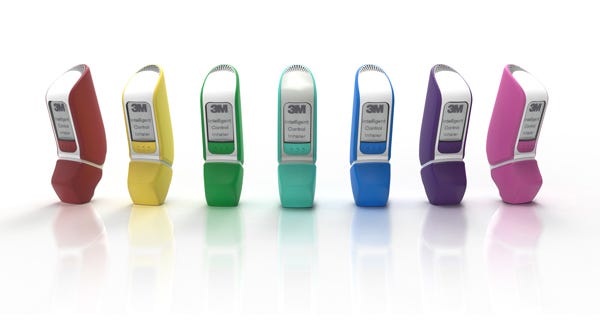April 21, 2016
Manufacturing giant 3M is seeking to change the game when it comes to chronic obstructive pulmonary disease treatment.
Nancy Crotti
|
The 3M Intelligent Control inhaler includes a roughly 1-in.-by-1½-in. screen to provide patients with real-time instruction on whether they are using the device correctly. (Image courtesy of 3M) |
3M has announced a "smart inhaler" that not only connects wirelessly to a smartphone app but has a tiny screen that teaches patients how to use the device.
The 3M Intelligent Control inhaler is the latest entrant into a field that's become crowded with companies working to increase chronic obstructive pulmonary disease (COPD) patient compliance with treatment and decrease trips to the hospital. Research has shown that up to 70% of COPD patients use inhalers incorrectly.
3M has been working in inhalation development for 60 years. The company talked with healthcare providers and payers, all of whom said COPD patient compliance and adherence are bad.
3M incorporated electronics into the inhaler "to actually instruct the patient in real time how to use the device," said Steven Wick, technical director of 3M Drug Delivery Systems in St. Paul, MN. The device is designed to begin delivering the drug when the patient inhales and monitors drug delivery for deep, consistent lung penetration from dose to dose, Wick said.
The approximately 1-in.-by-1½-in. screen will tell a patient if the inhaler is at the wrong angle, and will even count down the number of seconds the patient needs hold her breath after each inhale, Wick said. The inhaler will feed all of the information to the app, which will coach the patient on how to improve her technique. The app would also send patients reminders about taking their next dose.
The inhaler also has sufficient memory to know when a patient switches to a different medication, according to Wick. Pharmaceutical companies would not have to change their canister packaging, he added.
In a study of 26 adults aged 18 to 55, 95% used the inhaler properly with minimal instruction, Wick noted. Because many COPD patients are older, clinical trials will include them, he added.
The company expects to have documentation from Phase I and Phase II-A clinical studies by the end of this year, and for Phase III by mid-2017. If all goes well, 3M hopes to gain FDA approval in 2019. Each pharmaceutical company that partners with 3M on using its drug in the device would need separate FDA approval as a drug-device combination, according to Wick.
Other companies, including Propeller Health in Madison, WI, have already won FDA approval for "connected" inhalers to help asthma and COPD patients with adherence. Propeller won its first FDA approval for asthma technology in 2012. Most recently, the company obtained clearance for use of its technology with the GlaxoSmithKline Diskus dry powder inhaler and Boehringer Ingelheim's Respimat inhaler, marking the first time the system can be used to track daily medication use rather than only emergency-based medication use.
Propeller Health's technology can be used to drive adherence via messages on a user's smartphone in addition to email- and text-message-based reminders. The system is also compliant with the Qualcomm Life's 2net Hub.
3M's technology takes patient adherence one step further, according to Wick.
"We have been able to clinically demonstrate significantly better device competence versus a ["press and breathe"/standard inhaler] and Respimat device," Wick said in an email. "This improved device competence leads to significantly reduced variability in drug delivery--a two-fold reduction in variability versus a P&B device and a four-fold reduction in variability versus the Respimat device."
Propeller CEO David Van Sickle did not immediately return a request for comment.
3M announced the smart inhaler at the Respiratory Drug Delivery conference in Scottsdale, AZ, this week, leading to lots of conversations with possible pharma partners.
"No one signed yet, but there's a lot of interest, a lot of excitement, so I expect we will start signing partners very soon," Wick said. "It can be customized to meet the pharmaceutical company's needs."
The device would be reusable for 12 months, one aspect that the company hopes will keep the overall cost down.
3M is focusing on COPD now, but may add inhalers for asthma patients down the road.
Learn more about cutting-edge medical devices at MD&M East, June 14-15, 2016 in New York City. |
Nancy Crotti is a contributor to Qmed and MPMN.
Like what you're reading? Subscribe to our daily e-newsletter.
About the Author(s)
You May Also Like



